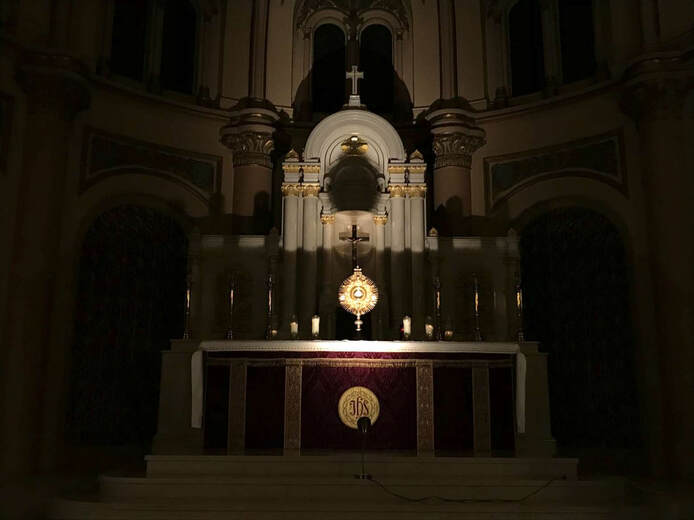
Today is Corpus Christi, although for many years the feast has been transferred to the following Sunday. Corpus Christi, however, is properly celebrated on Thursday, because it was on Thursday that the Lord instituted the Most Holy Eucharist at the Last Supper. In moving this feast to Sunday, we lose the sense of a sacred moment in history, a particular day (Thursday) on which the Lord instituted the Sacrament of His Body and Blood at the Last Supper. The older calendar celebrates Corpus Christi on Thursday for those who can come (we had about 40 at Mass this morning) but celebrates it again the following Sunday, for all the faithful. I find the older practice more practical—it provides the feast both for those who can participate on the very day itself, but also for everyone on the following Sunday. It provides the opportunity, also, for some of us to celebrate the great feasts twice, because … once is never enough!
Responsible for My Blood
The feast of the Body of Christ was promoted by St. Thomas Aquinas, who composed the hymns for this Mass in the 13th Century, after the Eucharistic miracle at Bolsena (blood stains manifesting on a Mass corporal, now kept in the chapel at Orvieto, north of Rome). Thomas’ friend, Pope Urban IV, made it a universal feast in 1264. Thomas’ poem, the Lauda Sion, is the longest sequence in the Roman liturgy.
The Epistle for today is from 1 Cor 11. The Apostle Paul hands on the faith he has received, that “the same night Christ was betrayed, He took bread and wine, offered thanks, and said ‘this is my body and this is my blood.’” Therefore, Paul continues, whoever eats and drinks the Body and Blood unworthily “shall be guilty of the Body and Blood of the Lord.” My own Archbishop has pointed out that very few Catholics understand what “worthy” reception of Holy Communion means. It doesn’t mean you have to be a saint to receive the Eucharist, but it does mean you have to “recognize” (in Paul’s words) the Real Presence. That “real presence” is essentially in the Sacred Species, but not limited to the Sacred Host and Precious Chalice. It is also in the entire Body of Christ, in every human person created in the image of God. As Mother Teresa said, “every person is Christ,” and “the Blessed Eucharist we receive at morning Mass, and the bodies of the poor we touch later in the day on the streets—it is the same Jesus.”
If a Catholic were to receive the Body of Christ at Mass, and then order the killing of innocent persons later in the day, he or she would be receiving the Eucharist “unworthily.” That Catholic would not in fact be “recognizing” the Real Presence at Mass because he or she is not “recognizing” the presence of God in other human beings. Catholic lawmakers who promote slavery, or abortion, or genocide—any killing of innocent human beings—should not present themselves for Holy Communion. Taking the Eucharist thus “unworthily,” they would be guilty of the Blood of Christ—not only killing innocent human beings, but killing Christ Himself, who said “what you do to the least of my brethren, you do to me.”
And this is exactly what is happening today. The nation’s most powerful lawmaker, and the nation’s most powerful executive, receive Holy Communion with great fanfare, and later in the day promote the killing of innocent children.
Eucharistic Coherence
My Archbishop publicly called all Catholic public officials to “Eucharistic coherence” (in the words of Pope Francis) in a May 1st Pastoral Letter. If you say you believe in the Body of Christ at Mass, he pointed out, you must respect the Body of Christ in all people outside of Mass. If you can’t do that, you should not receive Holy Communion, until you do learn to respect all human life.
He was immediately accused of “politicizing the Eucharist,” even by some brother bishops who should know better. What he is actually trying to do is keep these officials from becoming guilty of spilling the Blood of Christ. If the Speaker of the House, or the President of the United States, promotes the killing of children, they kill Christ. They cannot at the same time kill Christ and receive Christ in Holy Communion. The Body of Christ, St. Paul points out, is not a source of life for such people, but a condemnation unto death. God is not mocked. We don’t break the laws of Nature, and of Nature’s God. We break against them. Let us pray that all Catholics, but especially those entrusted with the Common Good, recognize the Body and Blood of the Lord.


 RSS Feed
RSS Feed